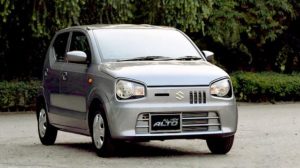Suzuki Alto Also Discontinued & Banned on Motorways?
Yesterday was a day of mixed emotions for car enthusiasts in Pakistan, especially for fans of the Suzuki Alto and Wagon R. The news of Pakistan Suzuki Motor Company (PSMC) permanently halting bookings for the Wagon R sent shockwaves through the automotive community. Known for its affordability and fuel efficiency, the Wagon R has been a favorite among the middle class for years. But the surprises didn’t end there.
The Rumor Mill in Overdrive
Soon after, rumors began circulating on social media claiming that the Suzuki Alto, PSMC’s all-time bestseller, had been discontinued. To add fuel to the fire, another rumor suggested that the National Highway Authority (NHA) had banned the Alto from motorways.
The latter rumor seemed to gain traction after a recent tragic incident where an Alto was crushed by a fully loaded 12-wheeler truck, leaving the tiny hatchback in pieces. The visuals of the accident were horrifying, sparking debates about the safety of small cars on highways. Social media was flooded with speculation, with some claiming the Alto has banned from entering high-speed motorways. But how much of this was true?
PSMC Sets the Record Straight
To separate fact from fiction, we reached out to PSMC officials, who promptly debunked both rumors. First, they clarified that the Alto has not been discontinued. Instead, the company is likely to stop production of the Alto VX variant, which lacks essential safety features like airbags and ABS. Listening this was not actually surprising, as we have already written a piece on it.
Moving forward, customers will only be able to purchase upgraded variants of the Alto, equipped with advanced safety features such as dual airbags, ABS, and ISOFIX child seat anchors. This decision aligns with global automotive trends, where safety is becoming a non-negotiable priority.
The Motorway Ban: Fact or Fiction?
As for the second rumor, the NHA has not imposed any ban on the Alto for motorway use. National Highway and Motorway police (NHMP) Spokeperson clarified the situation saying, “There is no news yet”. The speculation seemed to have emerged in the aftermath of the aforementioned accident, where the Alto’s fragile build was starkly exposed.
While the ban claim was false, it did reignite concerns about the Alto’s structural integrity. Time and again, videos of Alto accidents have gone viral, showing how even minor collisions can reduce the car to scrap metal, sometimes with tragic consequences.
The truth is, while the Alto remains a popular choice for its affordability and low running costs, its safety limitations are undeniable. The recent upgrades are a step in the right direction, but they also serve as a reminder that safety should never be compromised for cost. For now, the Alto continues to rule the roads, but its future will depend on how well it adapts to the evolving demands of safety-conscious consumers.
In the end, the rumors may have been false, but the conversations they sparked are very real. The Alto’s story is far from over, but it’s clear that the road ahead will require more than just affordability to stay relevant. As consumers become more aware of the importance of safety, automakers like Suzuki will need to strike a balance between cost and quality to keep their place in the market. For now, the Alto lives on, but its journey is far from smooth.



Man the fact is people drive Alto like maniac. I have seen people overspeeding alto to 140 on motorways like it’s a jet. And then accidents happens and blame game starts about build quality.